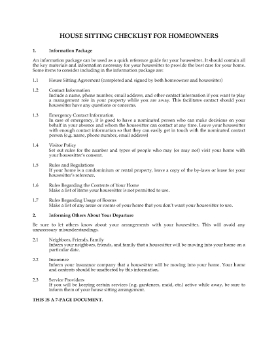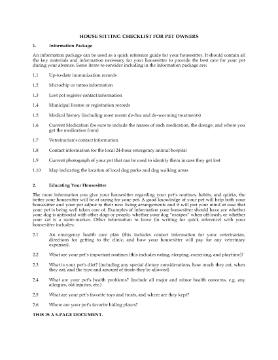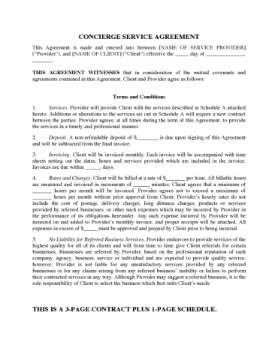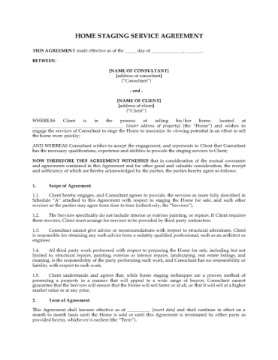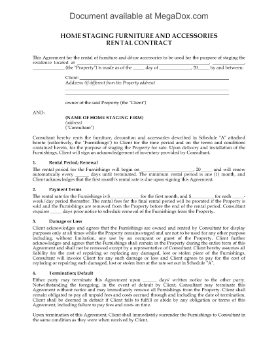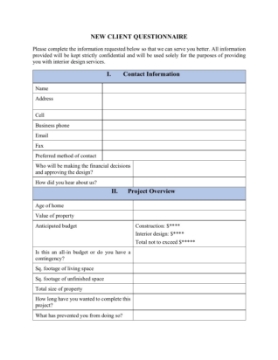Concierge Contract
Prepare a contract to provide concierge services for a client with this customizable template.
Why You Need a Concierge Contract Form
If you offer concierge services, it is essential to formalize your working relationship with clients through a written contract. This Concierge Contract template provides all the necessary legal provisions to help safeguard both parties and clarify expectations.
Independent Contractor Status
Under this agreement, the concierge operates as an independent contractor, not as an employee of the client. This distinction ensures that the concierge manages their own work processes and responsibilities independently.
Billing and Expenses
The concierge will invoice clients for billable hours on a monthly basis. In addition, any valid expenses incurred during the provision of services will be reimbursed, as outlined in the contract.
Third Party Liability
The concierge assumes no liability for products or services delivered by third party businesses. This provision clarifies that the concierge’s responsibility does not extend to services or goods outside their direct control.
Contract Termination
Either party has the right to terminate the contract, provided they adhere to the terms specified within the agreement. This flexibility allows for a professional exit should circumstances change.
Dispute Resolution
In case of disagreements, both parties agree to pursue mediation as the first step in resolving disputes. This approach encourages collaborative problem-solving and avoids costly litigation.
Force Majeure
The contract contains a force majeure clause to address circumstances beyond the concierge’s reasonable control. This provision protects both parties from unforeseen events that could impact service delivery.
Applicability
This Concierge Contract template is suitable for use with both corporate clients and individuals, offering versatility for a range of business scenarios.
Customization
The template is designed for easy customization, enabling you to tailor its provisions to meet your specific requirements.
House Sitting Checklist
Are you leaving a house sitter in charge of your home during a holiday or business trip? Fill out this House Sitting Checklist before you go.
The 7-page house-sitting checklist adresses everything that needs to be done before you leave and everything your house sitter needs to know, including:
- your travel information, itinerary and schedule, numbers you can be reached at, emergency contacts, rules and regulations, etc.;
- letting your friends and family know when and for how long you'll be gone;
- which areas and items in your home are off-limits;
- any vehicle care and maintenance required;
- care and feeding of any pets to be left with the house sitter;
- suspending or continuance of utilities and services;
- providing for the house sitter's needs (childcare, storage space, etc.);
- grounds maintenance;
- security protocols.
This House Sitting Checklist Form is available in MS Word format, and is easy to fill out by hand or on the computer. It can be used anywhere.
Home Staging Contract
If you provide home staging and interior design services to customers who are preparing to sell their homes, you need to use a written Home Staging Contract.
This document sets out clear expectations and responsibilities for both service providers and homeowners, ensuring a professional and organized approach to staging projects.
Sale Guarantees and Pricing
The homeowner acknowledges that while staging can enhance the presentation of the property, it does not guarantee a sale or that the home will sell at the asking price. The contract clarifies that the results of staging are influenced by many factors beyond the control of the design consultant.
Staging Service Exclusions
The staging services outlined in the contract do not include the costs associated with hiring outside contractors. This means that expenses for painters, repair professionals, or other specialists needed to prepare the home are not covered by the staging agreement and must be handled separately by the homeowner.
Use of Furnishings and Additional Costs
Whenever possible, the design consultant will utilize the homeowner’s existing furniture and décor. If additional items are necessary, the homeowner is responsible for the costs of renting furniture, and purchasing any accessories or supplies required for staging and redesigning the property for sale.
Homeowner Responsibilities
The homeowner is solely responsible for packing personal belongings, de-personalizing and decluttering spaces, cleaning the home, and covering any storage costs for items that need to be removed during the staging process.
Proper Use of Rented Items
The homeowner agrees that rented items provided for staging will be used exclusively as display pieces and not for any other purpose during their time in the home.
Additional Clauses and Provisions
The contract includes additional clauses specifically for homes that are vacant prior to staging. There are also special provisions addressing services related to virtual tours, ensuring clarity for both in-person and digital presentations of the staged property.
Customizing the Agreement
Every service business benefits from a well-drafted customer agreement. The Home Staging Contract template is designed for interior design professionals, allowing you to download, personalize, and adapt the document to suit the exact needs of your business and your clients. One of our top 5 bestsellers!
Home Staging Furniture Rental Contract
Use this Home Staging Furniture Rental Contract to set out the rental terms for furnishings and decor used in staging a property for sale.
- Furniture and accessories are being installed for display purposes only. The clients and their family, guests and pets are not allowed to use the rental items during the staging period.
- The client is responsible for the costs of repairing or replacing any items lost or damaged by an occupant of the household or any guest or visitor.
- The client grants the staging consultant permission to enter and use the property for the purpose of installing the furniture and accessories and providing home staging services.
- The client is responsible for removing and storing all valuables.
- The client authorizes the consultant to move or rearrange any of the client's own furniture and personal property, except for specific named items.
- The consultant's liability will not exceed the total fees paid by the client.
- If you supply furniture and design accessories as part of your home staging service, you should use this contract form.
- Available in MS Word format and fully customizable to meet your exact needs.
Interior Designer Client Intake Form
Use this comprehensive Client Intake Form to develop a plan for an interior design project for a new client.
- The document comes in MS Word format and can be converted to a PDF form or to a web-based form.
- The form gathers information from the client regarding:
- details of the project, including budget, expected timelines and scope of work,
- a list of other project consultants and contractors (architect, builder, etc.),
- information about the household members, how they currently use the space and what their future plans and requirements are for the home,
- design goals and preferences, such as color schemes, types of flooring, window treatments, etc.
- The information provided by the client will allow you to build a profile from which the interior design plan can be developed.


